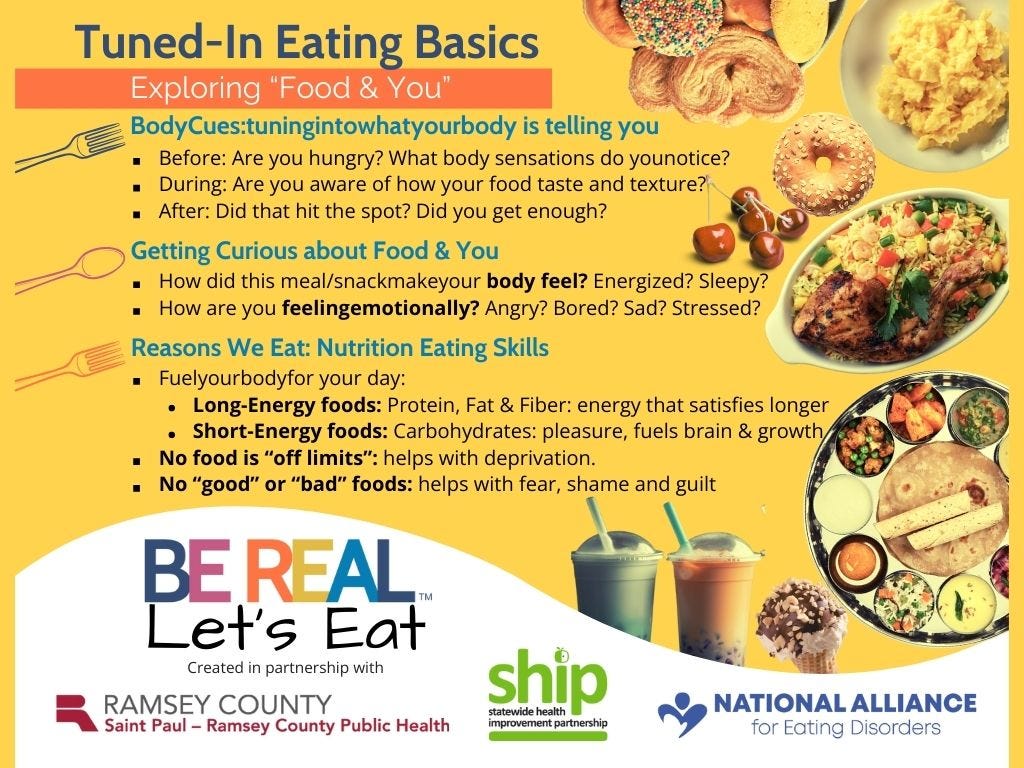Episode 110: What if My Child Eats "Too Much" or "Too Little"?
Description
In this episode: Anna and Elizabeth unpack one of the most common parent worries, how much kids eat. We explore how diet culture fuels fear, why restriction and pressure backfire, and how to use structure (not restriction or control) to support kids’ self-regulation.
We discuss:
* Why social media “perfect plates” and lunchboxes fuel worry and fear
* The research on restriction
* Providing structure without micromanaging your child’s eating
* Tweens/teens still need support (even if they look independent)
* When appetites fluctuate
* Special considerations for ADHD meds and ARFID
Links & Resources
* Division of Responsibility (sDOR) — Ellyn Satter Institute
* Podcast with Naureen Hunani on prioritizing felt safety in feeding.
Sunny Side Up posts to support this episode
* Sunny Side Up Feeding Framework
* Tips for Serving Dessert with Dinner
* Handling Halloween Candy: A Step-by-Step Parent Guide
* A Simple Guide to Eliminate Diet Culture from Halloween
Other links
* Caffè Panna: the ice cream Elizabeth ordered.
* Pinney Davenport Nutrition, PLLC
* Lutz, Alexander & Associates Nutrition Therapy
* Photo by Angela Mulligan on Unsplash
Share this episode with a friend who’s navigating mealtime worries.
Transcript
Elizabeth Davenport (00:01 )Welcome back to Sunny Side Up Nutrition. Hi, Anna. Today we’re going to talk about a really common worry parents bring up: What if my child eats too much or too little?
Anna Lutz (00:04 )Hi, Elizabeth.Right, I feel like this is a universal concern. Parents are always worrying about how much their child is eating. Sometimes they’re worried they’re eating too much. Sometimes they’re worried they’re eating too little. I feel it’s never just right—thinking about Goldilocks. That’s what parents do best, including myself—worry. But we all want our kids to grow up, grow well, and be healthy, of course.
Elizabeth Davenport (00:31 )Yeah.
Anna Lutz (00:35 )I think what we really want to talk about today is how diet culture sends so many confusing messages to parents and kind of fuels that worry—fuels the worry of parents—so that they focus a ton on what their child should eat, how much their child should eat, etc.
Elizabeth Davenport (00:56 )Yeah, exactly. And so we’re going to talk about where those worries come from and why restriction and pressure to eat certain foods—more food, less food—backfire, and what parents can do instead to support their child’s relationship with food. Let’s jump in. Yes.
Anna Lutz (01:15 )That’s right. I’m really excited—I’m excited about this episode because I think most parents can relate to this.
Elizabeth Davenport (01:19 )Me too. Yes, I mean, we both can, right?
Anna Lutz (01:25 )Of course—100%, 100%. And it can change day to day. It almost can be humorous—how you’re worrying about one thing one day and then the next day you’re worrying about the opposite. Yeah. So yeah, let’s jump in. Why do parents’ worries about their child eating either “too much” or “too little”—those are in quotes—usually come from?
Elizabeth Davenport (01:36 )Exactly.I mean, as you said in the beginning, diet culture really has such a strong influence over everything that we believe about food. And social media—I mean, it’s all over social media: how much kids should be eating, what they should be eating. And it’s confusing even because it’s visual, and parents may see pictures of lunchboxes or plates and think, “My gosh, wait, I’m feeding my kid too much,” or “My gosh, I’m not feeding my kid enough or enough of the right foods.” And so I think one: I’ll caution, right? For parents, it’s so easy to compare what we’re doing to what’s out there. And really we have to do what we know is best, and it’s impossible to fully know how much is in those pictures when people show how much they’re feeding their kids.Other places that parents get these messages are from conversations with well-meaning pediatricians or other healthcare providers—also well-meaning family members, certainly grandparents. No hate—
Anna Lutz (02:41 )Very true.
Elizabeth Davenport (02:59 )—grandparents here because they can be really awesome, but they also sometimes forget what their role is, or it’s unclear what their role is. Right? And yeah—just, overarching, it comes from diet culture messaging.
Anna Lutz (03:07 )True. True.And often it’s linked—not always, but often—it’s linked to the child’s body size. Don’t you think? So if someone—whether it’s a pediatrician or family member or parent—is worried that the child is, “too big,” they’re focusing on, “Well, they must eat too much.” And then conversely, if there are worries about a child being “too small,” that kind of fuels the worry of, “My gosh, my child’s not eating enough.”
Elizabeth Davenport (03:22 )Yes.
Anna Lutz (03:44 )So that’s where that diet culture and weight bias really can make an impact and then translate to how we feed our children.
Elizabeth Davenport (03:54 )Exactly.And because there’s so much information available to us now, parents are just bombarded with this. Even if they’re not on social media, they’re bombarded with this kind of information.
Anna Lutz (04:07 )It’s so true—it’s so true. And I feel like it’s important to really note that when we see those images on social media that you mentioned—or someone says, “This is how much someone should eat”—there are so many more factors. Even us as dietitians, we would never be able to tell a parent, “This is exactly how much this child should eat at this meal.”
Elizabeth Davenport (04:30 )Exactly.
Anna Lutz (04:31 )Because they’re growing, their activity levels—
Elizabeth Davenport (04:31 )It’s a great point.
Anna Lutz (04:34 )— are different. It depends what they ate earlier in the day; it depends what they didn’t eat earlier in the day or last week. And so there’s not some magic amount that if we just knew what it was—because even as pediatric dietitians, it’s not something that is definable.
Elizabeth Davenport (04:39 )Yeah. Exactly. Exactly. So this is a nice segue into why it’s so hard to really trust children to self-regulate their food intake.
Anna Lutz (05:05 )That’s such a good question because it’s kind of at the heart of it. I think because diet culture has so heavily influenced parenting and our medical system—and a big role of diet culture is to evoke fear—it tells us we can’t trust bodies.
Elizabeth Davenport (05:29 )Right.
Anna Lutz (05:30 )Right—we need to control bodies.And so instead of really telling parents, “You know what? Children’s bodies are wise, and your job is to support them in eating and, over time, developing their eating skills,” instead we’re told, “You need to make sure your child doesn’t eat too much of this, and you need to make sure your child eats enough of this.” These messages to parents are: don’t trust your child. And often parents aren’t trusting their own bodies, so then it’s a leap—
Elizabeth Davenport (06:02 )Exactly.
Anna Lutz (06:03 )—to then trust your child’s body.I think a few things to highlight here—and you probably have some ideas about this too—we’ve got research that really backs this up. One thing that comes to mind is research showing that when parents restrict their children’s eating— they might be worried their child’s eating too much and they restrict—
—then what we actually see is increased eating and sneak eating as a result. And so it doesn’t “work.” If the goal is for the child to eat less, it doesn’t work for a parent to restrict their eating. What is some other—
Elizabeth Davenport (06:34 )Exactly.
Anna Lutz (06:46 )—research we should highlight?
Elizabeth Davenport (06:51 )Oh my gosh, that’s a good question. And I’ll be honest here—that is not one of my strengths, remembering the research.
Anna Lutz (06:57 )Well, I was thinking about how we know that pressure doesn’t help either. So, the opposite: if we’re worried a child isn’t eating enough and we start t
























